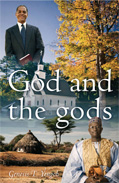
 |
The future looks very bright indeed for Nsiemboh Ngoske. Unlike so many of his colleagues, who seem to spend their time looking for ways to leave the job early, he is a dedicated government employee who takes pride in doing his best on a project. Such diligence does not go unnoticed for long, and soon Nsiemboh finds himself rising in the ranks and being given more and more responsibility. As the firstborn son, he also knows his duty to his family, so in addition to providing for his wife and children he generously passes much of his financial gains to his parents and siblings. Of course, there will always be those who are jealous of someone else's success, and their envy can sometimes lead them down dark paths. To protect their son from witchcraft or other nefarious attacks, Nsiemboh's parents seek out the help of practitioners of traditional medicine to safeguard him. But will their efforts result in keeping the family's chief provider out of harm's way, or will their opening the door to the occult possibly lead to tragedy?
Yengoh's well-written and thought-provoking tale of the clash of worldviews in Oku, Cameroon, succeeds on many levels. First, as a story of a family's love and loss it rings true with universal and identifiable emotions, even for those unfamiliar with the lush African backdrop. Lydia's pride in her son's accomplishments as well as her enjoyment of how his success elevates her own status is instantly recognizable irrespective of culture. Likewise, Elias' overwhelming despondency toward the end of the book when he absorbs the fact that his own inattention to detail has placed the life of his child in peril will be easily understood, even if never experienced, by almost any parent. Second, the book succeeds as a fascinating study of the duality of religious and social thought in Cameroon. While statistics show that over 70% of the country's population claim Christianity as their religious faith, as Yengoh so clearly illustrates that worldview is often coupled with a strong belief in the power of the spiritual forces and practices associated with the tenets of traditional African religion. Almost every character in the book, whether a professing Christian or not, seems to seek out ways to cover their bases through traditional medicine and rites, and those who opt to ignore the strict rules of the secret religious societies pay the price. Third, the author's tale stands out as an excellent addition to the rich tradition of West African literature.
Although unique both thematically and narratively, the book fits easily into the ranks of other great novels of the region such as Things Fall Apart by Chinua Achebe or some of the darker works by Wole Soyinka and Bessie Head. Yengoh gilds the lily at times with superb craftsmanship. For example, in one of the final scenes of his book, the author describes in excruciating detail the painstaking construction by a character of the hangman's noose he will use to commit suicide. The exquisite care and pride that is shown in making something so personally destructive is absolutely haunting and possibly the most poignant moment in the book.
Yengoh is currently a researcher in Sweden but was born and raised in Cameroon and has a deep understanding of the world that he writes about. Filled with believable characters, cultural insights, and intriguing themes, his tale of a family's descent into tragedy is both powerful and heart-wrenching.
RECOMMENDED by the US Review